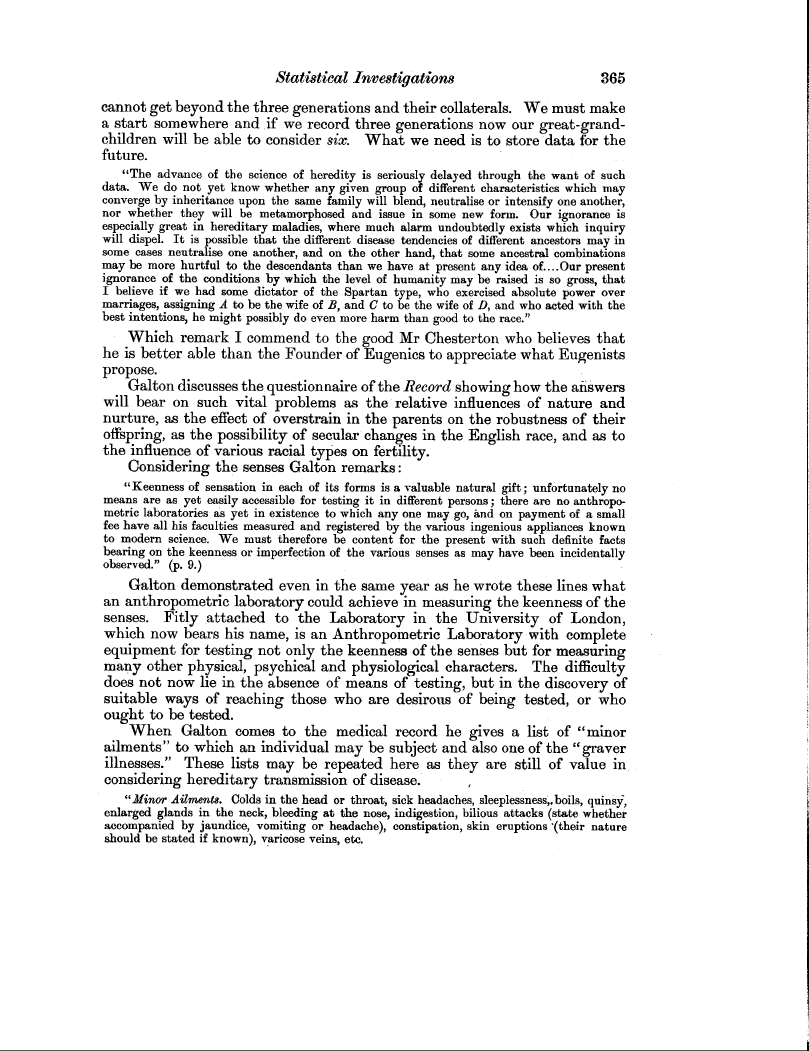Statistical Investigations 365
cannot get beyond the three generations and their collaterals. We must make a start somewhere and .if we record three generations now our great-grandchildren will be able to consider six. What we need is to store data for the future.
"The advance of the science of heredity is seriously delayed through the want of such data. We do not yet know whether any given group of different characteristics which may converge by inheritance upon the same family will blend, neutralise or intensify one another, nor whether they will be metamorphosed and issue in some new form. Our ignorance is especially great in hereditary maladies, where much alarm undoubtedly exists which inquiry will dispel. It is possible that the different disease tendencies of different ancestors may in some cases neutralise one another, and on the other hand, that some ancestral combinations may be more hurtful to the descendants than we have at present any idea of. ... Our present ignorance of the conditions by which the level of humanity may be raised is so gross, that I believe if we had some dictator of the Spartan type, who exercised absolute power over marriages, assigning A to be the wife of B, and C to be the wife of D, and who acted with the best intentions, he might possibly do even more harm than good to the race."
Which remark I commend to the good Mr Chesterton who believes that he is better able than the Founder of Eugenics to appreciate what Eugenists propose.
Galton discusses the questionnaire of the Record showing how the answers will bear on such vital problems as the relative influences of nature and nurture, as the effect of overstrain in the parents on the robustness of their offspring, as the possibility of secular changes in the English race, and as to the influence of various racial types on fertility.
Considering the senses Galton remarks
"Keenness of sensation in each of its forms is a valuable natural gift; unfortunately no means are as yet easily accessible for testing it in different persons ; there are no anthropometric laboratories as yet in existence to which any one may go, and on payment of a small fee have all his faculties measured and registered by the various ingenious appliances known to modern science. We must therefore be content for the present with such definite facts bearing on the keenness or imperfection of the various senses as may have been incidentally observed." (p. 9.)
Galton demonstrated even in the same year as he wrote these lines what an anthropometric laboratory could achieve in measuring the keenness of the senses. Fitly attached to the Laboratory in the University of London, which now bears his name, is an Anthropometric Laboratory with complete equipment for testing not only the keenness of the senses but for measuring many other physical, psychical and physiological characters. The difficulty does not now lie in the absence of means of testing, but in the discovery of suitable ways of reaching those who are desirous of being tested, or who ought to be tested.
When Galton comes to the medical record he gives a list of "minor ailments" to which an individual may be subject and also one of the "graver illnesses." These lists may be repeated here as they are still of value in considering hereditary transmission of disease. ,
"Minor Ailments. Colds in the head or throat, sick headaches, sleeplessness,. boils, quinsy, enlarged glands in the neck, bleeding at the nose, indigestion, bilious attacks (state whether accompanied by jaundice, vomiting or headache), constipation, skin eruptions '(their nature should be stated if known), varicose veins, etc.

